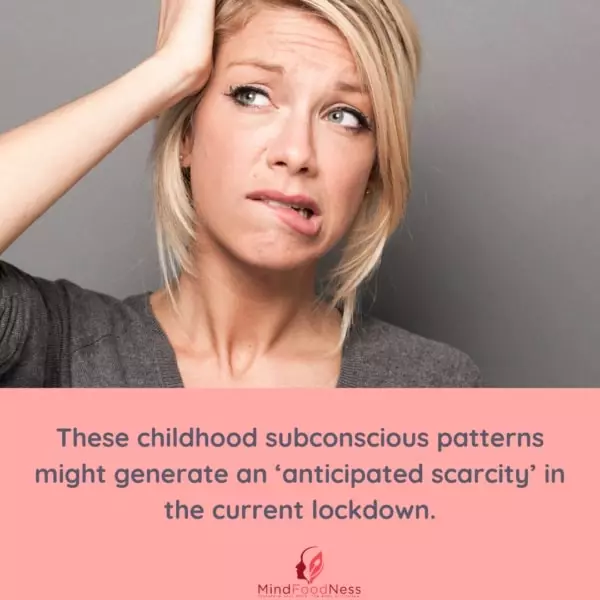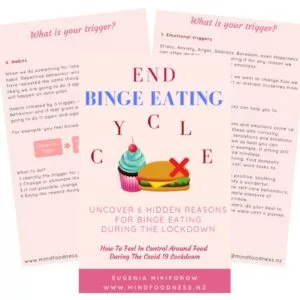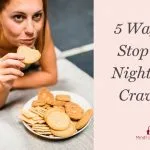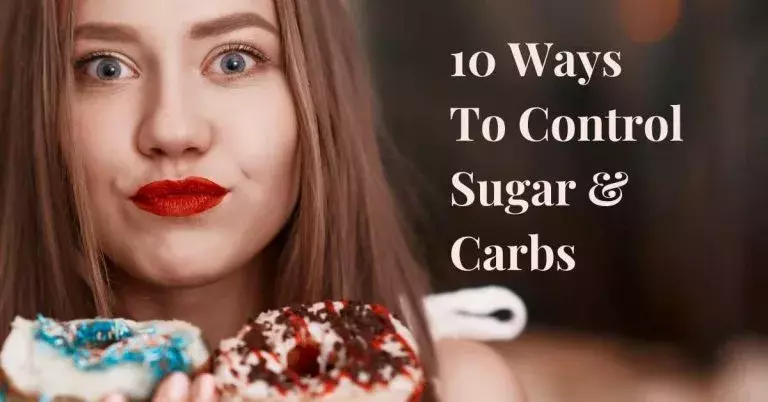LOCKDOWN BINGE
Are you finding yourself binge eating on snacks or overeating on stockpiled food during lockdown? Most of us probably have more food at home than usual, whilst spending more time at home. Throw in the intense uncertainty of the Covid-19 situation with the possible resurfacing of our personal challenges with food, and we have a potentially challenging situation. Given that there are many reasons binging or overeating might be occurring, how on earth do we navigate it? And most importantly, what can you do?
VIDEO
2: 49mins – Psychology of overeating and binge eating
4:08 mins – Perceived food scarcity
7:40 mins – Stress related eating
9:20 mins – Boredom
10:40 mins – Creating habits
13:00 mins – Practical suggestions
16:30 mins – Managing stress + golden tip
WHY YOU MIGHT BE OVEREATING AND BINGE EATING DURING THE COVID-19 LOCKDOWN
1)Human psychology
Essentially, the way human psychology operates is we want what we can’t have. The forbidden fruit metaphor is well-known to most of us. If you do not allow yourself to eat certain foods, they automatically become more appealing. If we are constantly seeing food we never allow ourselves to eat in the pantry or fridge, it will be hard to resist. Some people might even give themselves permission to indulge, ‘I don’t care, I am in lockdown for 4 weeks anyway. I can go back to clean eating once this is all over’. If you have a strong diet mentality this might be you too? I will now explore some reasons why binge eating and overeating might be occurring. Because if we uncover these, we can actually take control back of our eating.

2)Anticipated food scarcity
Anticipated food scarcity can be one reason we binge. Now, obviously food is not scarce (for most people reading this blog at least). I am living in New Zealand and food is readily available. However, some might perceive or feel a sense of scarcity if we ever felt this in our childhood experience.
For example, we might have grown up in a country that did in fact lack food. Or, perhaps our parents did not allow us to eat certain foods, or lacked finances to eat certain foods. Also, if a parent had issues around their body and weight, these issues of fear can be easily projected onto the child unknowingly through control and the restriction of food. These childhood subconscious patterns might generate an ‘anticipated scarcity’ in the current lockdown. Consequently, you might feel like panic buying or binge eating everything in your pantry.

3)Stress
Many of us use food as a coping mechanism. It is a soothing and temporal distraction that makes us feel good for a moment. If we are feeling stressed, food can distract us from our thoughts and worry. I call it self-medication with food. And it is something we learn because we have done it in the past and we know it works to make us feel good. How do you feel when you eat chocolate? Many clients say it relaxes them and they feel good. So their brain remembers this feel-good sensation. So, when stress creeps in, they will open up bars of chocolate to soothe the pain. Now, this ‘self-medication’ could be sex, pornography, shopping, alcohol or drugs, or any combination of these. (Check out my interview with Kiwi Talkz #43 @ 14:30mins where I talk about how chocolate activates the reward system in our brain)
4)Boredom
Boredom is an interesting reason we might binge or overeat. Again, like responding to stress this is a learned behaviour. If I am bored, and feel this sensation in my body, I will find something that will ‘fix’ that for a moment. It not only gives us something to ‘do’ but highly palatable food releases dopamine, the feel good hormone. This process creates a habit and whenever we feel bored we will automatically reach for the pack of chips or chocolate biscuits. So, understanding habit formation is critical in developing awareness in shifting the pattern.
UNDERSTANDING HABIT FORMATION
There are 3 components of a habit. There is a trigger, behaviour and reward. Triggers can be emotions, stress, situations, or even food. Behaviours are the actions we take (such as eating) in order to feel good. This ‘feel good’ sensation is the reward. Now, we always only do something if it meets our needs. So the question is, what is my need? If I eat because I am bored, that meets my need to overcome the boredom. I want to be entertained and have fun, to do something I enjoy. The critical question here is, how can I meet that need in another way?
Example of changing a habit
How do we change a habit? First, we go back to the trigger (boredom was the trigger). Then, we either avoid or eliminate the trigger. For example if we become bored watching TV at night causing us to binge, we begin to plan things we enjoy doing (calling a friend, playing with your children, talk with your partner, doing an online class, or listening to a podcast). We can also change our behaviour. If we are feeling bored, your behaviour might be sitting and allowing the sensation of boredom. Tell yourself gently, ‘I am bored, I am just going to sit with this feeling. It is ok to feel this, I do not need to change how I feel all the time.’

PRACTICAL SUGGESTIONS FOR THE TIME IN LOCKDOWN
It is not only critical we hold awareness about what is happening (and consciously shift habits that do not serve us), but have practical ways to overcome what we no longer want in our life. Here are some practical tools you can apply at home.
Out of sight
If you have a stock-pile of food at home, place it at a physical distance. Excess food in the pantry becomes a sensory and visual trigger. Simply , ‘I see food, I become hungry for it’. So place it in the shed, garage or high up in your cupboards. Out of sight, out of mind.
Other practical tools for this lockdown
This is a high-stress time for many. My suggestion is you look for other ways to soothe yourself to manage the stress, whilst elevating your mood. For example:
- walking (get outside and physically move whilst getting healing vitamin D)
- morning routine (5 minute morning gratitude meditation / restorative yoga (I offer online classes at Body Love Yoga Classes)
- journal (write out your feelings in a stream-of-consciousness manner will help untangle stress and emotions)
- talk to a friend or loved one (talk out your feelings)
- stay connected to people outside of your bubble (via zoom or houseparty apps – harness the amazing technology we have)
- plan activities at home so you have something to look forward to (this can be as simple as watching a movie)
- have projects to focus on (but at the same time, don’t place unnecessary pressure)

GOLDEN TIP
My clients who are doing well at this time are all doing one common thing. They are keeping a routine. For example, they get up and go to bed at the same time. They eat meals and snacks at certain times of the day. Also, they do not leave longer than 3-4 hours between meals. Keeping up an eating routine like this might help you too. You could also try looking into mindfulness exercises around food or read my blog Mindfulness and Food Choices.
COMPASSION AND KINDNESS DURING THIS LOCKDOWN PERIOD
Finally, be compassionate with yourself and others. This is an extreme situation that we have never dealt with before. So of course we will automatically revert to familiar coping mechanisms. And, remember to set realistic goals, focusing on progress and not the destination. I talk about goal setting in Beauty Haven’s article that unpacks the diet culture in Australia and New Zealand – READ HERE.
FREE GUIDE
To find out more about binge eating, download the Free Guide 9 Hidden Reasons For Binge Eating And Over Eating During Covid-19 Lockdown

FREE GUIDE REVEALS
6 Hidden Reasons for Binge Eating and Overeating During Covid 19 Lockdown
- Uncover what is driving your overeating and food cravings
- Beat binge eating with immediately actionable tips
- Feel in control with stocked up food without giving up eating food you love
- Create an easy relationship with food
- Address the root causes
- Eat flexibly without restrictions



